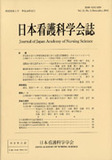Japanese
English
- 販売していません
- Abstract 文献概要
- 参考文献 Reference
- サイト内被引用 Cited by
要旨
本研究の目的は,告知され手術を受ける胃癌患者のストレス認知に対して,認知行動療法による介入研究を行い,患者のセルフエフィカシーの強化と心理的ストレス軽減を目指すものである.介入内容は,毎週の面接と患者自身によるノート記述(セルフモニタリング)であった.研究に使用した概念モデルはストレス対処理論(Lazarus&Folkman,1984)で,対処の自己効力概念についてはBandura(1977,1986)の社会的学習理論を用いた.
本研究の介入評価には,気分(DAMS:福井,1997),一般性セルフエフィカシー(GSES:坂野ら,1986),心理的ストレス反応(SRS-18:鈴木ら,1997)の測定尺度を用いた.研究参加者は26名(介入群14名,非介入群12名)であったが,うち対象者は20人(介入群9名,非介入群11名)であった.介入評価時期は,介入開始前(告知後一週間),退院時,退院一ヶ月後の3時期とした.結果は以下のとおりである.
1)平均値比較では,退院時の「SRS-18総得点」・「SRS-18抑うつ不安」因子,退院一ヶ月時の「SRS-18抑うつ不安」因子が改善していた(p<0.05).
2)経時変化比較では,介入開始前から退院において,介入群の「DAMS肯定的気分」が非介入群に比べて改善(p<0.05)していた.
3)群別多重比較では介入群は,退院時の「気分」が非介入群より改善していた.また,その効果は退院一ヶ月も持続していた(p<0.05).
4)しかし一般性セルフエフィカシーの強化は退院時も退院後一ヶ月も,どの尺度においても認められなかった.
本介入では,退院・退院一ヶ月時において「気分」やストレス反応の「抑うつ・不安」に対する介入効果は見られた.しかし本介入による一般性セルフエフィカシーへの効果はみられなかった.
Abstract
The aim of this study was to evaluate the effect of cognitive behavior therapy for self-efficacy and psychological stress.
The study subjects were gastrectomy patients with the early stage of gastric cancer, and interventions comprised of weekly counseling and journal writing. Conceptual framework of this study was based on Lazarus's Stress model (1984), and for the framework for Self-efficacy is based on the Social Learning Theory (Bandura, 1977, 1986). Three scales were employed to evaluate the effect of interventions: general self-efficacy (GSES: Sakano and Toujyou, 1986), mental stress response (SRS-18: Suzuki et al., 1997), and moods (DAMS: Fukui, 1997).
Subjects were allocated to either intervention group (IG (n=14)) or to control group (CG (n=12)) and of those twenty completed the study (9 and 11, respectively).
Subjects were assessed at baseline, at the time of discharge, and 1 month after discharge.
Results:
1) Two sample t test revealed that IG had significantly lower SRS-18 total scores and SRS-18 subscale (depression-anxiety) scores than CG did at discharge. One month after discharge, depression-anxiety scores for IG remained significantly lower than that for CG (p<0.05).
2) Split Plot Design Repeated Measure ANOVA revealed that DAMS subscale scores (positive mood) for IG improved significantly from baseline to discharge (p<0.05).
3) Dunnett's test of multiple comparisons showed that IG had significantly improved moods than CG did at discharge, and the effects were sustained at 1 month after discharge (p<0.05).
4) Total General Self-Efficacy scores and any of the subscale scores between the two groups did not differ at discharge and 1 month after discharge.
In summary, interventions seemed to have contributed to the improvement of positive moods and depression-anxiety. However, interventions have failed to show any measurable impact on the general self-efficacy. Further research is necessary to confirm the findings.
Copyright © 2002, Japan Academy of Nursing Science. All rights reserved.


